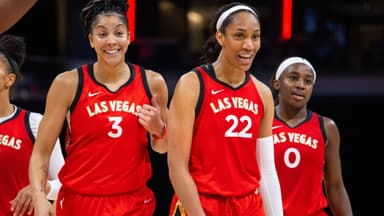Women’s basketball has come a long way from the early days of the WNBA, both in terms of its popularity and quality of play. As the rivalry between Caitlin Clark and Angel Reese has proven, though, it still has a long way to go in terms of the way the media covers it.
Advertisement
Keyshawn Johnson recently welcomed a couple of legends of the women’s game, Cheryl Miller and Candace Parker, to his podcast, and the three discussed the problematic way Clark and Reese are portrayed.
Miller compared the Clark-Reese rivalry to Larry Bird and Magic Johnson because of the intensity with which the two Hall-of-Famers competed against each other in both college and the pros. Clark and Reese still have long careers ahead of them, but they’re certainly on that path.
Miller pointed out, though, that the media doesn’t use the same words to portray Clark and Reese, opting instead for misogynistic language. “The difference is, with the men, it’s a rivalry, and it’s great theater,” Miller said. “The narrative is always different with the women. We’re either petty, or jealous, envious.”
Parker contrasted the portrayal of Clark and Reese’s obvious distaste for one another with the first matchup between Kevin Durant and Russell Westbrook after KD left the Thunder to join the Warriors. But she first shone a light on larger issues with the media’s coverage.
“I think that the narrative behind women’s sports is so interesting, because they want to judge you for everything other than basketball, and every element of life — how you act, what you say, how you dress, who you love — all of these things,” she said. “But then, they want to turn around and then when it’s convenient, judge you for basketball. So it’s just like you can’t win, honestly.”
“You talk about Russell Westbrook and Kevin Durant when KD decided to go to Golden State,” Parker said. “Everybody was tuned into that game to see how they interacted … But the narrative behind it was so different, where it was like, ‘OK, they just don’t like each other, they just bumped shoulders, oh they went head-to-head.’ They just don’t like each other, right?”
Parker also touched on the problematic racial element that enters the Clark-Reese conversation. She compared it to the coded way players of a certain ethnicity are described as “thugs.”
Racism enters the picture in the Clark vs Reese debate
The Bird and Magic rivalry helped the NBA reach new heights of popularity and fan interest. The Clark–Reese rivalry has done the same for the WNBA. Whichever player you root for, that’s a good thing. It will only help the league continue to grow and reach new audiences.
There will always be bad actors with ulterior motives when it comes to Clark and Reese. But it’s up to the media to rise above that and focus on what happens on the court. “Can we just make it about basketball?” Parker wondered. Hopefully, at some point, we can.








